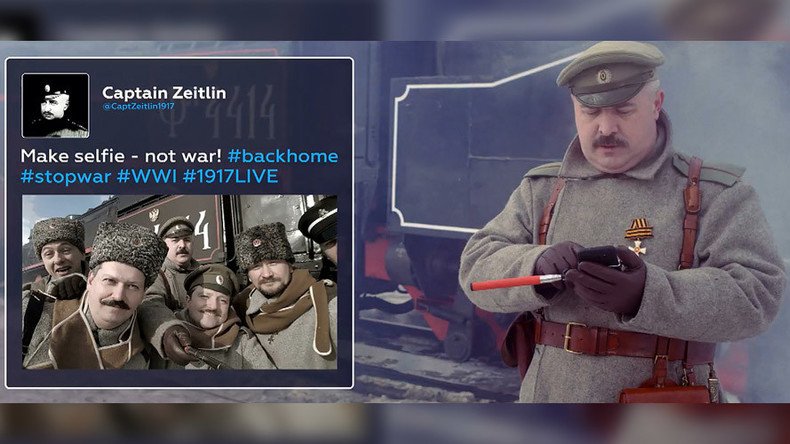#1917Live: Exhausted Russian Army on verge of turning against Nicholas II (VIDEO)

Poor logistics, high war casualties on the Eastern Front, and shortages of military equipment and food have left Russia’s capital Petrograd dangerously unstable in the latest developments from #1917Live, RT’s social media project in which we cover the events of 100 years ago in real time.
Last year’s Brusilov Offensive brought Russia initial gains against the teetering Austro-Hungarian Empire, but petered out due to supply problems, adding around a million men to the casualty list. In all, more than a million men have died, and over four million have been wounded. 1.5 million deserted the army in 1916 alone.
Nonetheless, a conference of the Entente powers in Petrograd is plotting a new offensive.
#Entente conference in #Petrograd is over; Alliance’s commanders agree to start #generaloffensive in April #1917LIVEpic.twitter.com/1hWEPzSi4c
— Russian Telegraph (@RT_1917) 20 February 2017
“Our allies can rightfully expect Russia to meet obligations in full,” tweeted Nicholas II, who personally took command of the army in 1915.
.@BritishEmb1917 Our allies can rightfully expect Russia to meet obligations in full #1917LIVE
— Tsar Nicholas II (@NicholasII_1917) 20 February 2017
Despite its losses, Russia alone still has more manpower than all the Triple Alliance powers put together, and tens of thousands of soldiers move through Petrograd, a major transport hub on the way to the front.
My most urgent task now is to deploy troops stationed in #Petrograd to battlefield ASAP. These young men don’t belong here #1917LIVEpic.twitter.com/rXnTdWs9mR
— General Khabalov (@GenKhabalov1917) 19 February 2017
“Troops keep coming to Petrograd. We’re packed in like sardines in these barracks, but newcomers don’t seem to be rushing to the front line,” Captain Vasily Zeitlin tweeted.
New recruits don't seem to have any military training but what's more confusing is that many have never been in a big city before #1917LIVEpic.twitter.com/cARIvPASbt
— Captain Zeitlin (@CaptZeitlin1917) 19 February 2017
Troops keep coming to Petrograd. We’re packed like sardines in these barracks, but newcomers don’t seem to be rushing to frontline #1917LIVEpic.twitter.com/M4AHLiv6BA
— Captain Zeitlin (@CaptZeitlin1917) 18 February 2017
“Saw another unit of recruits here in Petrograd. They're so bewildered by tramways & coquettes that they can’t even march in step,” wrote Vladimir Khlebtsevich, a student at the local university.
Saw another unit of recruits here in Petrograd. They're so bewildered by tramways & coquettes that they can’t even march in step 😂 #1917LIVE
— Student Vladimir (@StudentVlad1917) 19 February 2017
Meanwhile, food prices have risen six-fold through the winter, and the city has stocks of no more than ten days, resulting in serpentine queues. Battling freezing temperatures, the crowds of mostly women sometimes resort to violence and looting.
Intermittent political protests, some spontaneous, others planned, such as the 12th commemoration of the failed revolution of 1905, have shaken the city. The reconvening of the increasingly non-compliant Duma is certain to be another flash-point.
Authorities fear outbreak of violence in #Petrograd on Feb 27, first day of @Parliament_1917 session #1917LIVEpic.twitter.com/YIc3hlzs5y
— Russian Telegraph (@RT_1917) 20 February 2017
The Tsar has already called for its dissolution, though is now reconsidering his decision.
I’ve refused the proposal to dissolve @Parliament_1917#1917LIVEpic.twitter.com/NBFqT9V507
— Tsar Nicholas II (@NicholasII_1917) 24 February 2017
But it’s not just the bourgeois deputies that are skeptical. Aleksandr Krymov, one of the top Russian generals, told the head of the Duma, Mikhail Rodzianko, that those on the front have lost faith in the command of Nicholas, but, equally importantly, that his ethnic German wife Alexandra, who oversees domestic affairs, is even more unpopular.
Head of UK mission considers Russian upheaval inevitable, top brass involved in plotting against @NicholasII_1917#1917LIVEpic.twitter.com/KvPdJoQ25G
— UK Embassy in Russia (@BritishEmb1917) 18 February 2017
Still, Rodzianko and other Duma deputies are not publicly advocating violence.
Despite the wild claims, I’m absolutely sure of all Russian workers’ patriotism. Fears of their defiance baseless #1917LIVE
— MP Mikhail Rodzianko (@MRodzianko_1917) 23 February 2017
Dear followers! DO NOT take part in highly publicized rallies! Stay indoors! DO NOT fall victim to provocations! Share this tweet! #1917LIVE
— FM Pavel Milyukov (@Milyukov_1917) 23 February 2017
The same cannot be said for ordinary workers, on the verge of starvation.
I regularly see activists at our factory trying to persuade workers to demand creation of a provisional government #1917LIVE
— Ivan Chugurin (@IvanWorker_1917) 21 February 2017
If @Parliament_1917 is dissolved, I’m sure there’ll be forces (not Bolsheviks!) that would resort to violence against authorities #1917LIVE
— Bogdanov, Bolshevik (@Bolsheviks_1917) 21 February 2017
Lieutenant-General Sergey Khabalov, appointed to oversee the Petrograd military district, assures Nicholas that the government can still maintain order.
Workers of Petrograd! Do not fall victim to provocations! Beware of state of martial law. Any uprising will be suppressed by force #1917LIVE
— General Khabalov (@GenKhabalov1917) 21 February 2017
I won't tolerate ANY violation of order & I won't hesitate to use force against revolutionaries if needed #1917LIVEhttps://t.co/Y5BHJEY2sx
— General Khabalov (@GenKhabalov1917) 18 February 2017
The revolution – now less than a fortnight away – is awaiting a spark.
Oh, what a time we had! 10yrs ago, April, in Italy. Playing chess with my comrades @Bolsheviks_1917 & Max Gorky #ThrowbackThursday#1917LIVEpic.twitter.com/y331nukvqS
— Vladimir Lenin (@VLenin_1917) 24 February 2017
You can currently follow the project by searching for the hashtag #1917Live on Twitter, and on February 27th we will be launching 1917.rt.com, a dedicated site through which you can see the latest live broadcasts, photos and updates from the year of the Russian Revolution.












